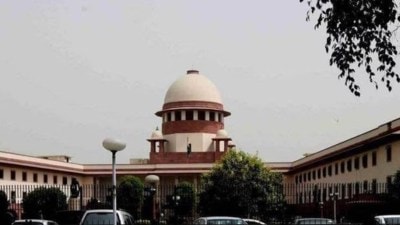SC order discourages drug innovation in India: Novartis
* Original innovation should be recognised to encourage investments
The Supreme Courts order rejecting Novartis AGs appeal will dissuade drug discovery and move R&D to favourable destinations,the Swiss pharma majors India arm said on Monday.
The verdict discourages innovative drug discovery essential to advancing medical science for patients, the firm said after the SC judgement. We strongly believe that original innovation should be recognised in patents to encourage investment in medical innovation especially for unmet medical needs, Ranjit Shahani,vice chairman and MD,Novartis India Ltd said on Monday in Mumbai.
Novartis,following the Indian patent offices decision to reject its patent application for a beta crystalline form of blood cancer drug imatinib mesylate in 2006,had filed a special leave petition in the apex court. It had sought clarification on primarily two sections Section 3(d) and Section 3(b) that requires any new invention to show significant improvement of therapeutic efficacy and define the kind of products that do not get patent protection. These sections,introduced at the time of the amendment of the law in 2004,essentially refer to modified forms of known discovery products such as salts,derivatives or polymorphs.
Mondays order ratifies the governments hard stance on the process called evergreening minor modifications in drugs to get extended patent protection. Novartis patent application for the crystalised form of imatinib mesylate was rejected in 2006 by the patent office in Chennai. Novartis had launched the modified form of the drug in India in 2003 under the brand name Glivec,priced at about Rs 1.2 lakh for a months treatment. The Chennai court,while dismissing Novartis appeal in 2007,also said the drug was too costly.
We brought this case because we strongly believe patents safeguard innovation and encourage medical progress, Shahani said. This ruling is a setback for patients that will hinder medical progress for diseases….
The countrys generic drug industry said the judgement would be good for cancer patients. We are pleased with the judgement which prevents the use of frivolous patents to deny access to medicines for patients, said YK Hamied,chairman,Cipla Ltd.
Sakthivel Selvaraj,senior health economist at the Public Health Foundation of India said the ruling sufficiently clarifies the scope of Section 3(d) and would,apart from making available newly patented drugs at lower costs,boost Indias own generic industry. Imatinib is on the national list of essential medicines and is used for certain blood and stomach cancers.
Domestic pharma firms cheer verdict
But concerns remain over lack of indigenous drug research
Abantika Ghosh
New Delhi: Domestic pharmaceutical companies hailed Supreme Courts Novartis verdict on Monday as a victory for patients and for the generic drug industry.
However,as India positions itself as a generic drug giant,there are concerns about the lack of indigenous drug research and the sole reliance on legal instruments like prevention of evergreening patents as in the Novartis case and the increasing proclivity to issue compulsory licences (CL) to make affordable drugs available to Indian people. The first CL was issued last year to Natco Pharma for Bayers anti-cancer drug Nexavar.
Replying to a question in Lok Sabha during the Budget Session of Parliament,health minister Ghulam Nabi Azad had said that in the five years of the eleventh five year plan between 2007 and 2012 no major research project for life saving drugs was undertaken in the country. This when every fifth generic tablet,capsule,or injection consumed anywhere in the world is sourced from India. The Indian pharma industry has grown from Rs 71,000 crore in 2007 to over Rs 1 lakh crore in 2009-10. Generic drugs exports has shot up by 60 per cent from Rs 24,570.26 crore in 2009-10 to Rs 40,218.15 crore in 2011-12.
There is no doubt that this (SC verdict) is good for patients,but in the long run it is not a good situation for either the Indian pharma industry or for researchers because it does not incentivise in any way development of new drugs., says Harsh Dua,consultant oncologist at Indraprastha Apollo Hospitals.
The Indian pharma industry has grown without any support from the government so development of new molecules too is self-funded. We have two projects nearing phase III trials… The SC verdict was expected and is really good for both the Indian pharma industry and for patients. Foreign firms should look at the per capita income here before pricing products, said Dharmesh Shah of BDR Pharma.
DG Shah of the Indian Pharmaceutical Alliance said that the judgement is a landmark that will set to rest the controversy over the scope of Section 3(d) of the Indian Patents Act which is crucial safeguard against the extension of patent monopolies of known drugs and the delay in the availability of affordable generic versions.
SC judgement historic: Sharma
New Delhi: Commerce minister Anand Sharma described the Supreme Court judgement as historic and said Indian Patent Law conforms fully with global obligations under the WTOs TRIPS. It… reaffirms the position of the Indian law and in particular,provisions of Section 3 D which mandates the need for a substantive innovation while deciding on a case for grant of a fresh patent, a statement said. PTI
Photos




- 01
- 02
- 03
- 04
- 05



























